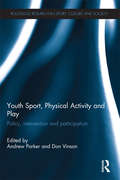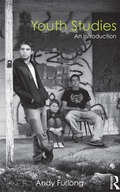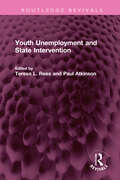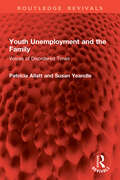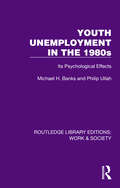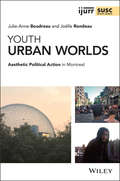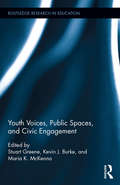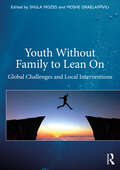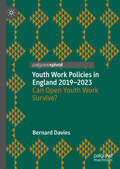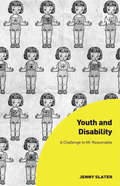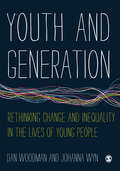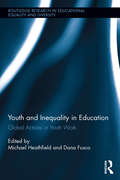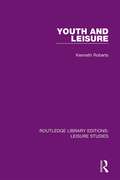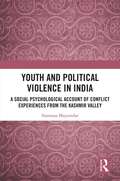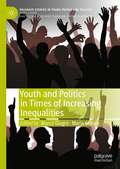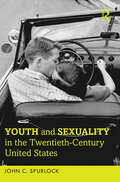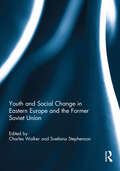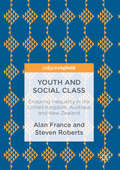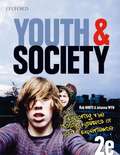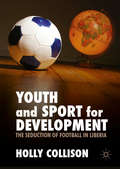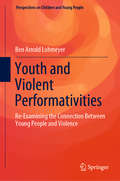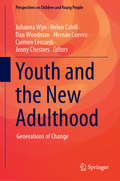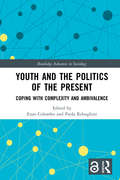- Table View
- List View
Youth Sport, Physical Activity and Play: Policy, Intervention and Participation (Routledge Research in Sport, Culture and Society)
by Andrew Parker Don VinsonSport, physical activity and play are key constituents of social life, impacting such diverse fields as healthcare, education and criminal justice. Over the past decade, governments around the world have begun to place physical activity at the heart of social policy, providing increased opportunities for participation for young people. This groundbreaking text explores the various ways in which young people experience sport, physical activity and play as part of their everyday lives, and the interventions and outcomes that shape and define those experiences. The book covers a range of different sporting and physical activities across an array of social contexts, providing insight into the way in which sport, physical activity and play are interpreted by young people and how these interpretations relate to broader policy objectives set by governments, sporting organisations and other NGOs. In the process, it attempts to answer a series of key questions including: How has sport policy developed over the last decade? How do such policy developments reflect changes at the broader political level? How have young people experienced these changes in and through their sporting lives? By firmly locating sport, physical activity and play within the context of recent policy developments, and exploring the moral and ethical dimensions of sports participation, the book fills a significant gap in the sport studies literature. It is an important reference for students and scholars from a wide-range of sub-disciplines, including sports pedagogy, sports development, sport and leisure management, sports coaching, physical education, play and playwork, and health studies.
Youth Studies: An Introduction
by Andy FurlongYouth Studies: an introduction is a clear, jargon-free and accessible textbook which will be invaluable in helping to explain concepts, theories and trends within youth studies. The concise summaries of key texts and the ideas of important theorists make the book an invaluable resource. The book also raises questions for discussion, with international case studies and up-to-date examples. The book discusses important issues within youth studies, for example: education and opportunity employment and unemployment family, friends and living arrangements crime and justice identities health and sexuality citizenship and political engagement. Suitable for a wide range of youth-related courses, this textbook provides a theoretical and empirical introduction to youth studies. It will appeal to undergraduate students on international academic and vocational courses, including sociology, politics, criminology, social policy, geography and psychology.
Youth Unemployment and State Intervention (Routledge Revivals)
by Paul Atkinson Teresa L. ReesIn the early 1980s, against the background of chronic unemployment in Britain, the particular plight of young people had come to be identified as a subject for special concern. Anxieties were expressed, as they were in the 1930s, as a twin concern for a waste of the nation’s resources and for the demoralization of youth, leading potentially to anti-social behaviour. Originally published in 1982, this volume of essays identifies a number of key issues in the pattern of state response to youth unemployment which had evolved in the inter-war and post-war periods. The contributors discuss a number of related themes, such as how the problem has been defined and created as a kind of ‘moral panic’, and how contemporary measures recapitulate the rhetoric and policies of pre-war interventions. They examine the relationship between youth unemployment measures and the education sector, the responses of the trade unions, and also consider how young people themselves respond to special programmes. A critical assessment is made of the further education elements in the special measures: in particular, the question is asked: do these young people need ‘social and life skills’ training? The book charts the changing nature of the state response to youth unemployment since 1974, and stresses throughout the inappropriate nature of ‘temporary’ amelioration of a long-term, even permanent, problem.
Youth Unemployment and the Family: Voices of Disordered Times (Routledge Revivals)
by Patricia Allatt Susan YeandleFirst published in 1992, Youth Unemployment and the Family examines an area of social life which has not been investigated widely: the relationship between parents and young adults living in the parental home. Tracing the effects of a poor labour market on 40 families in the North-East, the book reveals how change in the public domain of the economy penetrates the routines and intimacies of family life.The text gives voice to those affected, particularly to parents, who are seldom heard, revealing the continuing importance of the family in times of stress and its role in the mediation of social change. As well as social change, the theme of social order runs through the book: the pursuit of order and predictability through which people try to make sense of their lives, the resources out of which such order is constructed, and the essential fragility of the order created. The book is essential reading for anyone interested in the price paid for the economic restructuring of Britain that has been underway since the 1970s and challenges the notion that unemployment is more easily borne by those living in regions where it has been endemic. The book will be of interest to researchers of sociology, social anthropology, political economy, social policy and to anyone interested in working -class family and working-class culture.
Youth Unemployment in the 1980s: Its Psychological Effects (Routledge Library Editions: Work & Society)
by Philip Ullah Michael H. BanksYouth unemployment is one of the most critical problems generated by any recession. Widespread changes in the structure of the youth labour market, together with the increasing affluence amongst the employed, meant that the experience of unemployment for young people in the 1970s and 1980s was quite different from that of previous decades. Originally published in 1988, this book examines the psychological consequence of prolonged periods of joblessness among a national cohort of 16-19 year olds. It places the problem in a historical context and then examines evidence for the effect of unemployment on the work ethic, motivation to work, the search for jobs, psychological health, political views, lifestyles and early careers. Particular attention is paid to gender and ethnic group differences. Original research was integrated with existing literature with the aim of bringing together a wide variety of studies and theoretical positions previously dispersed throughout the literature.
Youth Urban Worlds: Aesthetic Political Action in Montreal (IJURR Studies in Urban and Social Change Book Series)
by Julie-Anne Boudreau Joelle RondeauBoth theoretically informed and empirically rich, Youth Urban Worlds explores how urban cultures affect political action amongst youth. Argues that urban cultures challenge the very meaning and contours of the political process Includes ethnographies, delving into the perspectives and knowledges of racialized youth, urban farmers, and “voluntary risk takers,” like dumpster divers, building climbers, and student protestors Theorizes that aesthetics are an increasingly crucial form of political action in the contemporary urban setting and explains the impact of aesthetics on the political Examines the centrality of fun, warmth, aesthetics, and embodiment to these youth’s experience of being in the world Explains how youth are able to practically and concretely impact the political process through the performance of risky and disruptive behavior
Youth Voices, Public Spaces, and Civic Engagement (Routledge Research in Education #159)
by Stuart Greene Kevin J. Burke Maria K. McKennaThis collection of original research explores ways that educators can create participatory spaces that foster civic engagement, critical thinking, and authentic literacy practices for adolescent youth in urban contexts. Casting youth as vital social actors, contributors shed light on the ways in which urban youth develop a clearer sense of agency within the structural forces of racial segregation and economic development that would otherwise marginalize and silence their voices and begin to see familiar spaces with reimagined possibilities for socially just educational practices.
Youth Without Family to Lean On: Global Challenges and Local Interventions
by Moshe Israelashvili Shula MozesYouth Without Family to Lean On draws together interdisciplinary, global perspectives to provide a comprehensive review of the characteristics, dynamics, and development of youth (aged 15–25) who have no family to lean on, either practically or psychologically.In this timely volume, Mozes and Israelashvili bring together leading international experts to present updated knowledge, information on existing interventions, and unanswered questions in relation to youth without family to lean on, in pursuit of fostering these youth’s positive development. The various chapters in this book include discussions on different topics such as social support, developing a sense of belonging, parental involvement, and internalized vs. externalized problems; on populations, including homeless youth, residential care-leavers, refugees, asylum-seekers, young women coming from vulnerable families, and school dropouts; and interventions to promote these youths' mentoring relationships, labor market attainment, out-of-home living placements, use of IT communication, and participation in community-based programs. Additionally, various problems and challenges are presented and elaborated on, such as: Who needs support? Who is qualified to provide support? How should related interventions be developed? The book takes a preventive approach and aims to emphasize steps that can be taken in order to promote young people’s positive development in spite of the absence of a family to rely on in their life and examines the best practices in this context, as well as the international lessons that deserve further dissemination and exploration. This book is essential reading for those in psychology, sociology, public health, social work, law, criminology, public policy, economics, and education and is highly enriching for scholars and practitioners, as well as higher education students, who wish to understand and help the gradually increasing number of youth who are forced, too early, to manage their life alone.
Youth Work
by Naomi NicholsCombining institutional ethnography and community-based research, Youth Work is a sophisticated examination of the troubling experiences of young people living outside the care of parents or guardians, as well as of the difficulties of the frontline workers who take responsibility for assisting them. Drawing from more than a year of on-site research at an Ontario youth emergency shelter, Naomi Nichols exposes the complicated institutional practices that govern both the lives of young people living in shelters and the workers who try to help them.A troubling account of how a managerial focus on principles like "accountability" and "risk management" has failed to successfully coordinate and deliver services to vulnerable members of society, Youth Work shows how competitive funding processes, institutional mandates, and inter-organizational conflicts complicate the lives of the young people that they are supposed to help. Nichols's book is essential reading for those involved in education, social services, mental health, and the justice system, as well as anyone with an interest in social justice.
Youth Work Policies in England 2019-2023: Can Open Youth Work Survive?
by Bernard DaviesThis book updates the policy and practice developments affecting youth services since the publication in 2019 of Austerity, Youth Policy and the Deconstruction of the Youth Service in England. It focuses on ‘open youth work’ settings such as youth centres and detached and outreach projects within the wider ideological, political and financial UK policy contexts. It pays detailed attention to the pandemic and cost-of-living impacts on young people, including on their mental health, examining how wider youth-focused state and voluntary provision and the National Youth Agency are responding. It also examines established and new routes to training and qualifying for work with young people. The book offers a distinctive source of evidence on, and analysis of, important areas of youth provision and practice and the policy priorities shaping these, which since 2018 have continued to have limited academic attention.
Youth and Disability: A Challenge to Mr Reasonable (Interdisciplinary Disability Studies)
by Jenny SlaterIn this ground-breaking book, Jenny Slater uses the lens of ’the reasonable’ to explore how normative understandings of youth, dis/ability and the intersecting identities of gender and sexuality impact upon the lives of young dis/abled people. Although youth and disability have separately been thought within socio-cultural frameworks, rarely have sociological studies of ’youth’ and ’disability’ been brought together. By taking an interdisciplinary, critical disability studies approach to explore the socio-cultural concepts of ’youth’ and ’disability’ alongside one-another, Slater convincingly demonstrates that ’youth’ and ’disability’ have been conceptualised within medical/psychological frameworks for too long. With chapters focusing on access and youth culture, independence, autonomy and disabled people’s movements, and the body, gender and sexuality, this volume’s intersectional and transdisciplinary engagement with social theory offers a significant contribution to existing theoretical and empirical literature and knowledges around disability and youth. Indeed, through highlighting the ableism of adulthood and the falsity of conceptualising youth as a time of becoming-independent-adult, the need to shift approaches to research around dis/abled youth is one of the main themes of the book. This book therefore is a provocation to rethink what is implicit about ’youth’ and ’disability’. Moreover, through such an endeavour, this book sits as a challenge to Mr Reasonable.
Youth and Generation: Rethinking change and inequality in the lives of young people
by Johanna Wyn Dan Woodman"Woodman and Wyn have produced a text that offers conceptual clarity and real depth on debates in youth studies. The authors skilfully guide us through the main sociological theories on young people and furnish us with sophisticated critiques from which to rethink youth and generation in the contemporary moment." - Professor Anoop Nayak, Newcastle University The promise of youth studies is not in simply showing that class, gender and race continue to influence life chances, but to show how they shape young lives today. Dan Woodman and Johanna Wyn argue that understanding new forms of inequality in a context of increasing social change is a central challenge for youth researchers. Youth and Generation sets an agenda for youth studies building on the concepts of 'social generation' and 'individualisation' to suggest a framework for thinking about change and inequality in young lives in the emerging Asian Century.
Youth and Inequality in Education: Global Actions in Youth Work (Routledge Research in Educational Equality and Diversity)
by Dana Fusco Michael HeathfieldThe transition to adulthood for many is mediated by class, culture, and local/global influences on identity. This volume analyzes the global injustices that create inequities and restrict future opportunities for young people during this transitional time, including poverty, unemployment, human rights, race, ethnicity and location. It critically examines global instances of youth discrimination, offering positive strategies and practices such as youth work that successfully remediate these injustices. With international contributions from Aotearoa New Zealand, Australia, England, Malaysia, Peru, Philippines, Portugal, Morocco, Jordan and the U.S., this volume is particularly important to researchers and scholars in the fields of youth studies, education, and social work.
Youth and Leisure (Routledge Library Editions: Leisure Studies #Vol. 3)
by Kenneth RobertsFirst published in 1983. In the 1980s, as they are today, young people were remaining longer in education, and were leaving better qualified, if only to face unemployment rather than real jobs and progressive careers. Traditional gender divisions and roles are being challenged. In this study, Kenneth Roberts uses evidence from youth and leisure research to examine the ways that young people were responding to these trends. His book combines theories of adolescence, of the role and growth of leisure, and of the sources and consequences of post-war youth cultures. Roberts stresses and explains the persistence of class and gender divisions through trends in clothing, music and hair artistry, and predicts that these patterns will survive changes. He explains why, even during the era of affluent young workers, the freedom of adolescence remained superficial, for most young people at least. The majority had never been granted any real alternative to using their ‘free’ time and money to embrace traditional class and gender roles. Contrary to popular reputations, Youth and Leisure argues that, on balance, youth cultures exercised a conservative influence and that the more radical styles are nurtured by middle- and not working-class youths. The analysis has policy implications which are drawn together in the final chapter. Practitioners are advised to recognise that youth and leisure services cannot override divisions and tastes grounded in the wider social structure, but this does not mean that these interventions must be ineffective. Roberts explains how leisure education and provision can modify broader patterns and enable all young people to explore the leisure opportunities their circumstances allow.
Youth and Political Violence in India: A Social–Psychological Account of Conflict Experiences from the Kashmir Valley
by Sramana MajumdarThis book offers a socio-cultural and interdisciplinary understanding of the impact of political violence on youth behaviour. Drawing on extensive fieldwork in the Kashmir valley and reports from conflict areas across the globe, the volume brings to focus the ways in which violence affects social and psychological dynamics within the individual and the community. It develops a social–psychological approach to the study of youth and violent conflict in South Asia and offers new insights into the intricacies within the discourse, Focussing on the emotions and behaviour of people in large-scale conflict, it expands the discourse on the psychological dimensions of hope, aggression, emotion regulation the extremist mindset and policy and intervention for peace building. Moving beyond western psychiatric models, this book proposes a more culturally and historically rooted analysis that focuses on collective experiences of violence to de-colonise psychological science and expand the understanding of youth’s experiences with political violence. The volume will be of great interest to scholars and researchers of politics, psychology, peace and conflict studies, sociology and social anthropology.
Youth and Politics in Times of Increasing Inequalities (Palgrave Studies in Young People and Politics)
by Marco Giugni Maria GrassoYoung people are very often the driving forces of political participation that aims to change societies and political systems. Rather than being depoliticized, young people in different national contexts are giving rise to alternative politics. Drawing on original survey data collected in 2018, this edited volume provides a detailed analysis of youth participation in nine European countries by focusing on socialization processes, different modes of participation and the mobilization of youth politics. "This volume is an indispensable guide to understanding young European’s experience and engagement of politics, the inequalities that shape young people’s political engagement and are sometimes replicated through them, and young people’s commitment to saving the environment and spreading democratic ideals. Based on compelling and extensive research across nine nations, this volume makes important advances in key debates on youth politics and provides critical empirical insights into which young people engage, influences on young people’s politics, how young people engage, why some young people don’t engage, and trends across nations. The volume succeeds in the herculean task of focusing on specific national contexts while also rendering a comprehensive picture of youth politics and inequality in Europe today."—Jennifer Earl, Professor of Sociology, University of Arizona, USA "Forecasts by social scientists of young people’s increasingly apathetic stance towards political participation appear to have been misplaced. This text, drawing data and analysis across and between nine European countries, captures the changing nature of political ‘activism’ by young people. It indicates how this is strongly nuanced by factors such as social class and gender identity. It also highlights important distinctions between young people’s approaches towards more traditional (electoral) and more contemporary (non-institutional) forms of participation. Critically, it illuminates the many ways in which youth political participation has evolved and transformed in recent years. Wider social circumstances and experiences are identified as highly significant in preparing young people for, and influencing their levels of participation in, both protest-oriented action and electoral politics."—Howard Williamson, Professor of European Youth Policy, University of South Wales, UK "This book is an incredible guide to understanding the role and sources of inequalities on young people’s political involvement. Country specific chapters allow the authors to integrate a large number of the key and most pressing issues regarding young people’s relationship to politics in a single volume. Topics range from social mobility and the influence of socioeconomic (parental) resources and class; young people’s practice in the social sphere; the intersection of gender with other sources of inequalities; online participation and its relationship with social inequalities; the impact of harsh economic conditions; the mobilization potential of the environmental cause; to the role of political organizations. Integrating all these pressing dimensions in a common framework and accompanying it with extensive novel empirical evidence is a great achievement and the result is a must read piece for researchers and practitioners aiming to understand the challenges young people face in developing their relationship to politics."—Gema García-Albacete, Associate Professor of Political Science, University Carlos III Madrid, Spain
Youth and Sexuality in the Twentieth-Century United States
by John C. SpurlockWhen did the sexual revolution happen? Most Americans would probably say the 1960s. In reality, young couples were changing the rules of public and private life for decades before. By the early years of the twentieth century, teenagers were increasingly free of adult supervision, and taking control of their sexuality in many ways. Dating, going steady, necking, petting, and cohabiting all provoked adult hand-wringing and advice, most of it ignored. By the time the media began announcing the arrival of a ‘sexual revolution,’ it had been going on for half a century. Youth and Sexuality in the Twentieth-Century United States tells this story with fascinating revelations from both personal writings and scientific sex research. John C. Spurlock follows the major changes in the sex lives of American youth across the entire century, considering how dramatic revolutions in the culture of sex affected not only heterosexual relationships, but also gay and lesbian youth, and same-sex friendships. The dark side of sex is also covered, with discussion of the painful realities of sexual violence and coercion in the lives of many young people. Full of details from first-person accounts, this lively and accessible history is essential for anyone interested in American youth and sexuality.
Youth and Social Change in Eastern Europe and the Former Soviet Union
by Charles Walker Svetlana StephensonTwo decades have now passed since the revolutions of 1989 swept through Eastern Europe and precipitated the collapse of state socialism across the region, engendering a period of massive social, economic and political transformation. This book explores the ways in which young people growing up in post-socialist Eastern Europe and the former Soviet Union negotiate a range of identities and transitions in their personal lives against a backdrop of thoroughgoing transformation in their societies. Drawing upon original empirical research in a range of countries, the book's contributors explore the various freedoms and insecurities that have accompanied neo-liberal transformation in post-socialist countries - in spheres as diverse as consumption, migration, political participation, volunteering, employment and family formation - and examine the ways in which they have begun to re-shape different aspects of young people's lives. In addition, while 'social change' is a central theme of the issue, all of the chapters in the collection indicate that the new opportunities and risks faced by young people continue both to underpin and to be shaped by familiar social and spatial divisions, not only within and between the countries addressed, but also between 'East' and 'West'. This book was originally published as a special issue of Journal of Youth Studies.
Youth and Social Class: Enduring Inequality in the United Kingdom, Australia and New Zealand
by Steven Roberts Alan FranceThis book addresses the recent marginalisation of class theory in youth sociology. The authors argue for the importance of reinstating class analysis as central to understanding young people’s lives in the United Kingdom, Australia and New Zealand. Their analysis recognises that in periods of social change, class relationships and processes can and do get reconfigured, but by drawing on the work of Pierre Bourdieu, they show that class, while being dynamic, remains core to shaping the everyday lives of young people. Students and scholars across a range of areas including the sociology of youth, sociology of education, social work and social policy will find this book of interest.
Youth and Society
by Rob White Johanna WynBuilding on the strengths of the highly respected first edition, Youth and Society, 2nd edition provides a comprehensive overview of the key issues, research, and theoretical developments in the sociology of youth. A new part, 'Theorising Youth', introduces the many and sometimes conflictingconceptualisations of youth and key theories. Other new chapters explore issues around youth and technology and indigenous youth.
Youth and Sport for Development
by Holly CollisonProcesses of development concerning reconciliation,rehabilitation and peace-building have become a central theme for globalorganizations tasked with intervening in broken and divided societies afterviolent conflicts. What can reunite populations divided by war and violencewhilst attempting to build a peaceful civil society? This book considers theimpact and value of sport, notably football, towards achieving this goal. Using extensive fieldworkfrom Liberia, Collison highlights the multiple and diverse stakeholders andactors aligning themselves with 'Sport for Development and Peace'interventions. By unpacking and conceptualising the ambiguous terminology,complex social effects and the lived experience of SDP, this book draw uponparticipant voices and the author's own lived experience within SDP to gainsymbolic understandings of culture, identity and the formal and informal socialstructures in which participants and interventionsoperate. Collison identifies that SDP has become fashionable withindevelopment agendas but it remains an aspirational image, a notion ofseduction, rather than a tested method of reintegration and youth developmentin post-conflict environments. Youth and Sport for Development questionsthe assumptions of SDP rhetoric and programs, and traces the effects offootball - the favoured vehicle of SDP- on youth in post-conflict Liberia. Examining three core themes: post-conflict development, youth and community,this book centralises the narratives of young football players in Liberia andwill appeal to scholars across Anthropology, Sociology, Sports Studies,Politics and Development.
Youth and Subculture as Creative Force
by Hans Skott-MyhreRadical youth work is gaining popularity as a means of teaching adults how, in collaboration with youth, they can challenge dominant ways of knowing. This study uses two particular subcultures, skinheads and punks, to explore how constructions of subcultures in time, language, space, body practice, and identity offer alternative ways of understanding youth-adult relationships. In doing so, it investigates youth work as a radical political process and suggests a new approach to current subculture theory. In Youth and Subculture as Creative Force, Hans Arthur Skott-Myhre interviews six youths who identify themselves as members of either punk or traditional skinhead subcultures. He discusses the results of these interviews and demonstrates how youth perspectives have come to inform his understanding of himself as a youth worker and scholar. Youth subcultures, he argues, have considerable potential for improving relations between youths and adults in the postmodern capitalist world. Drawing on Marxist, Foucauldian, and postmodernist theory, Skott-Myhre uses the subjective formations outlined in his study to offer recommendations for constructing legitimate radical youth work that takes into account for the perspectives of young people.
Youth and Violent Performativities: Re-Examining the Connection Between Young People and Violence (Perspectives on Children and Young People #11)
by Ben Arnold LohmeyerThis book challenges the dominant narrative of young people being a uniquely violent group. Instead, the book critically examines how young people become violent as they enact and resist the available violent performativities in youth. It focuses on the experiences of 28 young people in Australia who are subjected to violence, who use violence and who resist violence. A critical analysis of these young people’s “messy” stories facilitates a reframing of the physical violence routinely attributed to young people as a product of violating systems and structures. The author constructs a converging theoretical landscape to re-examine youth, violence and resistance at the intersection of the sociology of violence and the sociology of youth. Drawing on interviews with young Australians, the book makes a valuable contribution to contemporary international scholarship on youth and violence, while also examining the potential for complicity to violence in youth research and practice. In doing so it offers youth scholars and practitioners a framework for reassessing their theoretical frameworks and methods for studying and working with young people in connection with violence.
Youth and the New Adulthood: Generations of Change (Perspectives on Children and Young People #8)
by Johanna Wyn Jenny Chesters Dan Woodman Helen Cahill Hernán Cuervo Carmen LeccardiThis book investigates the life trajectories of Generation X and Y Australians through the 1990s and 2000s. The book defies popular characterizations of members of the ‘precarious generations’ as greedy, narcissistic and self-obsessed, revealing instead that many of the members of these generations struggle to reach the standard of living enjoyed by their parents, value learning highly and are increasingly concerned about the environment and the legacy current generations are leaving for their children and remain optimistic in the face of considerable challenges. Drawing on data from the Life Patterns longitudinal study of Australian youth (an internationally recognized study), the book tells the story of members of these ‘precarious generations’. It examines significant dimensions of young people’s lives across time, comparing how domains such as health and well-being, education, work and relationships intersect to produce the complex outcomes that characterize the lives of members of each of these generations. It also explores the strategies these generations use to make their lives and the ways in which they remain resilient. While the book is based on Australian data, the analysis draws on and contributes to the international literature on young people and social change.
Youth and the Politics of the Present: Coping with Complexity and Ambivalence (Routledge Advances in Sociology)
by Enzo Colombo Paola RebughiniYouth and the Politics of the Present presents a range of topical sociological investigations into various aspects of the everyday practices of young adults in different European contexts. Indeed, this volume provides an original and provocative investigation of various current central issues surrounding the effects of globalization and the directions in which Western societies are steering their future. Containing a wide range of empirical and comparative examples from across Europe, this title highlights how young adults are trying to implement new forms of understanding, interpretation and action to cope with unprecedented situations; developing new forms of relationships, identifications and belonging while they experience new and unprecedented forms of inclusion and exclusion. Grounding this exploration is the suggestion that careful observations of the everyday practices of young adults can be an excellent vantage point to grasp how and in what direction the future of contemporary Western societies is heading. Offering an original and provocative investigation, Youth and the Politics of the Present will appeal to students and researchers interested in fields such as Youth Studies, Globalization Studies, Migration Studies, Gender Studies and Social Policy.
